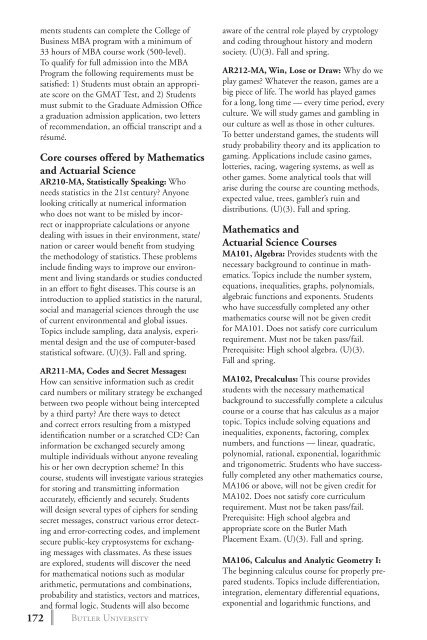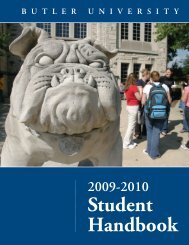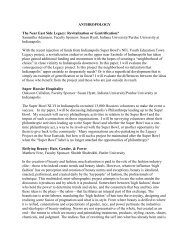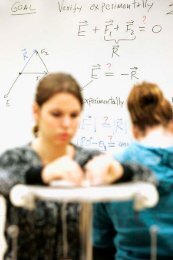2 0 1 3 bulletin - Butler University
2 0 1 3 bulletin - Butler University
2 0 1 3 bulletin - Butler University
You also want an ePaper? Increase the reach of your titles
YUMPU automatically turns print PDFs into web optimized ePapers that Google loves.
ments students can complete the College of<br />
Business MBA program with a minimum of<br />
33 hours of MBA course work (500-level).<br />
To qualify for full admission into the MBA<br />
Program the following requirements must be<br />
satisfied: 1) Students must obtain an appropriate<br />
score on the GMAT Test, and 2) Students<br />
must submit to the Graduate Admission Office<br />
a graduation admission application, two letters<br />
of recommendation, an official transcript and a<br />
résumé.<br />
Core courses offered by Mathematics<br />
and Actuarial Science<br />
AR210-MA, Statistically Speaking: Who<br />
needs statistics in the 21st century? Anyone<br />
looking critically at numerical information<br />
who does not want to be misled by incorrect<br />
or inappropriate calculations or anyone<br />
dealing with issues in their environment, state/<br />
nation or career would benefit from studying<br />
the methodology of statistics. These problems<br />
include finding ways to improve our environment<br />
and living standards or studies conducted<br />
in an effort to fight diseases. This course is an<br />
introduction to applied statistics in the natural,<br />
social and managerial sciences through the use<br />
of current environmental and global issues.<br />
Topics include sampling, data analysis, experimental<br />
design and the use of computer-based<br />
statistical software. (U)(3). Fall and spring.<br />
AR211-MA, Codes and Secret Messages:<br />
How can sensitive information such as credit<br />
card numbers or military strategy be exchanged<br />
between two people without being intercepted<br />
by a third party? Are there ways to detect<br />
and correct errors resulting from a mistyped<br />
identification number or a scratched CD? Can<br />
information be exchanged securely among<br />
multiple individuals without anyone revealing<br />
his or her own decryption scheme? In this<br />
course, students will investigate various strategies<br />
for storing and transmitting information<br />
accurately, efficiently and securely. Students<br />
will design several types of ciphers for sending<br />
secret messages, construct various error detecting<br />
and error-correcting codes, and implement<br />
secure public-key cryptosystems for exchanging<br />
messages with classmates. As these issues<br />
are explored, students will discover the need<br />
for mathematical notions such as modular<br />
arithmetic, permutations and combinations,<br />
probability and statistics, vectors and matrices,<br />
and formal logic. Students will also become<br />
172 <strong>Butler</strong> <strong>University</strong><br />
aware of the central role played by cryptology<br />
and coding throughout history and modern<br />
society. (U)(3). Fall and spring.<br />
AR212-MA, Win, Lose or Draw: Why do we<br />
play games? Whatever the reason, games are a<br />
big piece of life. The world has played games<br />
for a long, long time — every time period, every<br />
culture. We will study games and gambling in<br />
our culture as well as those in other cultures.<br />
To better understand games, the students will<br />
study probability theory and its application to<br />
gaming. Applications include casino games,<br />
lotteries, racing, wagering systems, as well as<br />
other games. Some analytical tools that will<br />
arise during the course are counting methods,<br />
expected value, trees, gambler’s ruin and<br />
distributions. (U)(3). Fall and spring.<br />
Mathematics and<br />
Actuarial Science Courses<br />
MA101, Algebra: Provides students with the<br />
necessary background to continue in mathematics.<br />
Topics include the number system,<br />
equations, inequalities, graphs, polynomials,<br />
algebraic functions and exponents. Students<br />
who have successfully completed any other<br />
mathematics course will not be given credit<br />
for MA101. Does not satisfy core curriculum<br />
requirement. Must not be taken pass/fail.<br />
Prerequisite: High school algebra. (U)(3).<br />
Fall and spring.<br />
MA102, Precalculus: This course provides<br />
students with the necessary mathematical<br />
background to successfully complete a calculus<br />
course or a course that has calculus as a major<br />
topic. Topics include solving equations and<br />
inequalities, exponents, factoring, complex<br />
numbers, and functions — linear, quadratic,<br />
polynomial, rational, exponential, logarithmic<br />
and trigonometric. Students who have successfully<br />
completed any other mathematics course,<br />
MA106 or above, will not be given credit for<br />
MA102. Does not satisfy core curriculum<br />
requirement. Must not be taken pass/fail.<br />
Prerequisite: High school algebra and<br />
appropriate score on the <strong>Butler</strong> Math<br />
Placement Exam. (U)(3). Fall and spring.<br />
MA106, Calculus and Analytic Geometry I:<br />
The beginning calculus course for properly prepared<br />
students. Topics include differentiation,<br />
integration, elementary differential equations,<br />
exponential and logarithmic functions, and
















